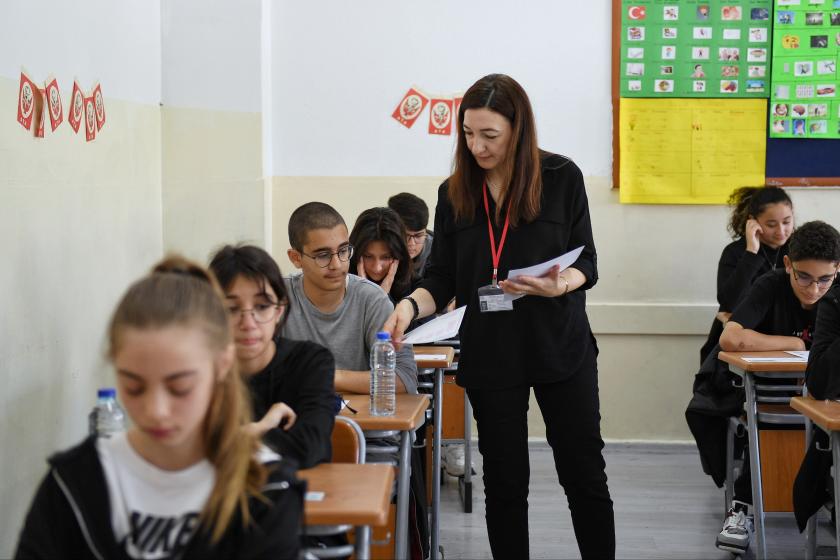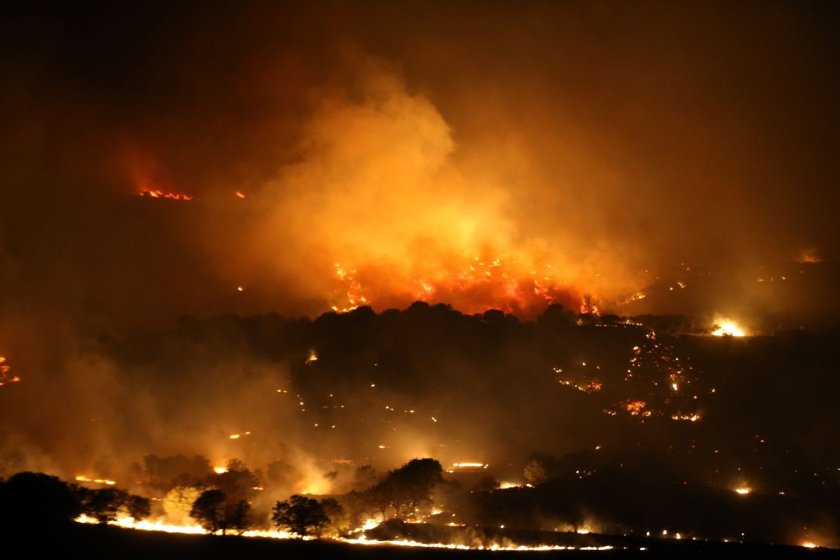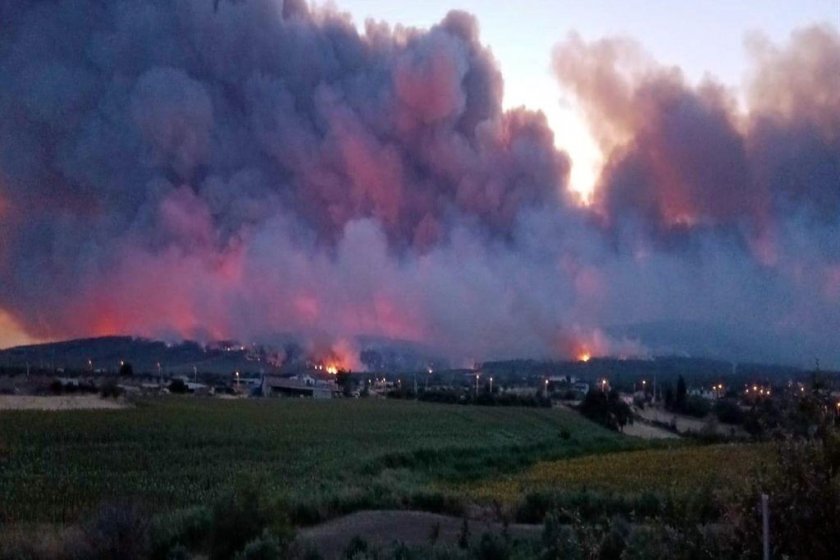Political scientists assess the trustee coup: Solidarity for democracy is a must
Political Scientists Seren Selvin Korkmaz and A. Celil Kaya assessed the appointing of trustees to the HDP Diyarbakır, Van and Mardin metropolitan municipalities.

Şerif KARATAŞ
İstanbul
Assessing the appointing of trustees to the HDP metropolitan municipalities of Diyarbakır, Van and Mardin, Political Scientist Seren Korkmaz said even minimum democracy was “for show” and the opposition had to defend democracy. Another political scientist, Celil Kaya stressed, “The opposition must take the Kurdish issue away from being a ‘security and terrorism’ issue and see it as an issue of democracy and cohabitation.”
Pointing to the destruction that has appeared along with regime change, political Scientist Seren Korkmaz said, “There is basically a form of government in which the executive organ can directly usurp the will of the electorate.” Stressing that what the opposition must do by way of principle is to defend democracy and democratic institutions, Korkmaz said, “There is no other way out apart from solidarity in the current system.” Recalling the alliance formed at the time of the local election in Istanbul, Korkmaz said, “The same principled alliance must be formed in solidarity with the people of the three metropolitan cities whose votes were usurped.”
Korkmaz replied to our questions.
In comments they made prior to the 31 March local election, President Erdoğan and Interior Minister Soylu spoke of trustees being appointed to HDP municipalities. What is your take on the appointing of trustees that was made to three HDP metropolitan municipalities?
In conjunction with the comments made prior to 31 March, one of the basic questions plaguing the minds of HDP voters was the question, “Even if we win, will trustees be appointed again to our municipalities?” Following the winning by the opposition of a significant number of metropolitan municipalities along with Istanbul and Ankara, expectations were created throughout Turkey of, “Will there perhaps be a transition to a process of normalization?” However, the central power holders are still operating with the same dynamics. Electoral competition is a minimum precondition for classifying regimes as “democratic” or “undemocratic.” For some time, elections in Turkey have not been held in a “fair and free” space. Proof comes in the form of the trustees that even elections, that is minimum democracy, is “for show.” Additionally, the appointments reveal more clearly the destruction that has come about under the absence of a balancing-checking mechanism in the presidential system. There is basically a form of government in which the executive organ can directly usurp the will of the electorate. The most serious situation that all of this has caused, however, is a rocking of the people’s trust in democracy and democratic institutions. The rerun Istanbul elections on 31 March and then the appointing of trustees has consolidated this feeling throughout Turkey.
Then there is a need to address the matter from its economic dimension. Metropolitan municipalities in particular are positioned by means of their budgets to distribute significant amounts of “bounty.” The 31 March elections saw a significant portion of this budget pass into the hands of the opposition. Regaining a portion of these resources and distribution of them through the trustees may be seen as an important means to enable the power holders to maintain their existence.
“IT MAY HAVE BEEN RESORTED TO IN RESPONSE TO THE EFFECTS OF THE ECONOMIC CRISIS”
The effects of the economic crisis deepen with each day that passes. In this context, are the appointed trustees helping to serve the purpose of security overtaking the economy and becoming the number one agenda?
Yes, there may be some such planning. Generally, when they are in difficulty in the economic or political arena, ruling entities may follow strategies such as creating the perception of an internal or external threat or bringing existing threats to the fore. This is a method to which frequent recourse is made by populist administrations like the AKP to mobilize the electorate. Especially in the past two to three years, the replies in public opinion polls to the question, “What is Turkey’s most pressing problem?” involve the economy and problems relating to the economy rather than security. Similar data emerged from the research “Political Polarization in Turkey Between Two Elections” we conducted as the Istanbul Political Research Institute (IstanPol). The economy and education emerge as the country’s two most important problems for both People’s Alliance and opposition voters because the electorate directly feels the effects of these problems on their daily life. The basic security problem for citizens who are struggling with unemployment and unable to make it through to the end of the month starts here. As things stand, as the effects of the crisis deepen, more frequent resort to moves of this kind will be made by the power holders.
However, there has been exposure of the expenditure that trustees made in the previous period. The wasting of public resources and living in luxury to this extent by those who hold power while the effects of the crisis are being experienced so deeply among the people creates a popular reaction that is far more easily mobilized. That is, these appointments may cause significant losses for the power holders in the long term by painting a picture of serious injustice in both an economic and political sense.
What kind of stance should the opposition, above all the CHP, take to the appointing of the trustees?
We have previously encountered the appointing of trustees. What followed was deep silence among the broad masses. However, the essential issue that will show us if there has been some kind of change in Turkey especially following 31 March will be the opposition’s stance towards this event. What in principle must be done is to defend democracy and democratic institutions. What behoves the opposition is to resummon the third principle intertwined with the ideals of democracy of the French Revolution that we have forgotten for some time: solidarity (fraternity), because there is no other way out apart from solidarity in the current system. From what I have been able to glean since yesterday, the appointments have earned rebuke from very wide circles, not least the CHP’s central and local administrators. The display of solidarity by CHP metropolitan mayors was very important. As one who has closely followed the CHP, I did not see a reaction at such a blunt rhetorical level to the previous appointments of trustees. This is essentially a situation that the democracy alliance that had its inception in the 16 April referendum and consolidated in the 31 March and 23 June process has produced. Despite all the oppression and rights violations in Turkey, there is still a very powerful resistance on the side of democracy and justice. The narrative of “injustice” was capable of appealing to the voters’ conscience in the rerun Istanbul elections. This was undoubtedly achieved by means of the “Istanbul alliance” on the side of democracy and justice. Now, the same principled alliance must be formed in solidarity with the people of the three metropolitan cities whose votes were usurped.
“IT IS QUITE HARD TO WIN AN ELECTION WITHOUT THE KURDS’ SUPPORT”
If not aired too much, there is talk of an early election. Is it possible to see the appointed trustees as the People’s Alliance’s election strategy?
If the trustees are seen as being a potential early election strategy, if you ask me, this is a move that will backfire because, if we look at Turkey’s recent political history, we see this country’s people have always been sensitive over electoral rights. We are talking about a country with very high voting rates. So, the electorate believes it will change certain things or preserve what it wants at the ballot box. To this end, it has still always managed to give a reply in some form at the ballot box to all kinds of oppression. In 1945, they brought the Democrat Party to power under the slogans, “Enough, the voice is the people’s” in opposition to the single-party system and in favour of a pluralistic democracy. With the DP’s heirs, the Justice Party and New Turkey Party, garnering 48% of the total vote in the first election held after the 1960 coup, they brought Özal to power after 1980 contrary to what the coupists were signalling. As things stand, the electorate still in one way or another gives the bluntest reply at the ballot box to the usurpation of electoral rights. The latest example of this is Istanbul’s rerun elections. Thus, if this is an electoral strategy, it shows us the desperation and hopelessness of the current power holders. It is fully losing through oppression a space that it could well win through normal and democratic means. Winning is not just holding onto office. The weakening of the AKP’s narrative is also an important loss because it is very hard to enter into dialogue with the Kurds and attain their support under an administration it has captured in this manner. It is a step that will deepen the loss in the long term. It is quite hard to win elections without the Kurds’ support in Turkey’s current three-way political structure. The Kurds are thus in an even more key position in the new system. That is, even if they regard democracy just in terms of “strategy” leaving values such as justice to one side, this is quite a wrong step. If this is considered along with the widespread rights violations and impaired judicial independence in Turkey, this situation that has emerged in connection with the elections and their results is causing serious destruction to Turkish democracy.
“THE KURDISH ISSUE IS NOT A ‘SECURITY’ ISSUE”
Stating that the appointing of trustees to the HDP’s three metropolitan cities lays bare the weakness in political terms of the power holders, Political Scientist Celil Kaya stressed, “The opposition must take the Kurdish issue away from being a ‘security and terrorism’ issue and see it as an issue of democracy and cohabitation.”
We spoke to academic A. Celil Kaya, who was expelled under a decree with the force of law from Ankara University Faculty of Political Sciences, about the appointing of trustees to the HDP Diyarbakır, Van and Mardin municipalities.
Stating that the appointing of trustees must be seen as part of the government’s political and ideological preference of the past three or four years, Kaya went on to note, “The appointing of trustees is hardly very surprising. We are going through a period in which the political rulership’s nationalistic, authoritarian and anti-Kurdist policies are entrenching. We can take 7 June 2015 as the starting point of these policies. The appointing of trustees to HDP municipalities is connected with these policies, too.” Recalling the regime change taking place in Turkey, Kaya continued, “Administrations of this kind display greater authoritarian trends as popular support declines because losing power amounts to the political destruction of that party and its cadres and maybe also their prosecution. A serious drop in the AKP’s vote was registered in the 31 March local elections. As such, the presidential system of government has also been opened up for debate. More oppressive, more authoritarian policies are implemented to prevent a weakening of power or not to give the impression of weakening. We can also interpret the trustees in terms of an ideological and political weakening of the power holders.”
“THE TIMING MAY BE CONNECTED TO THE EAST OF THE EUPHRATES”
To our question about the appointing of trustees to municipalities in a period in which the power holders were voicing rhetoric about an operation east of the Euphrates despite the “safe zone” deal, Kaya replied, “Their coinciding in the same period does not point to a direct connection but there is the following point: The government has made a kind of deal with the YPG and SDF with US intermediation east of the Euphrates. There has been a deal there that takes account of both Turkey’s and the SDF’s demands, in which neither side can get all they want but have their demands partially met. The existence of such a deal and, while following such a nationalistic and authoritarian policy towards the Kurds domestically, the making of a deal abroad, even if implied, with the YPG and SDF, labelled “terrorist organizations,” creates difficulty domestically for the power holders. Foreign policy and domestic policy are separate from one another, but in a period in which everyone can learn everything and information spreads easily, there is a need to resolve the resulting contradiction. It can also be seen as a move to pre-empt reactions from below such as, “Well, it is the PKK’s Syrian arm so why the deal?” that may confront them given a deal with the YPG and SDF abroad while following such a policy domestically. There was actually a plan to appoint trustees. Erdoğan implied prior to the election that if the HDP won municipalities they would appoint trustees. But the timeframe for this plan changed in line with developments. They probably wished for this earlier, but with the 31 March defeat and the ensuing huge trauma coming from Istanbul on 23 June, they waited to recuperate a bit. The timing may of course be connected to the east of the Euphrates.” Pointing to the alliance that had developed between the CHP and HDP base, Kaya noted that President Erdoğan was troubled most by this. Noting that if there is an alliance at headquarters level this can easily be criminalized but there is little chance of criminalizing an alliance forming at the base, Kaya said, “This problem is not something that can be solved in a couple of days. You might turn round and find anti-Kurdish sentiment increasing once more in the CHP base. I make such a reservation as I speak.” Stressing that pressure coming from below may change CHP headquarters, Kaya said, “The CHP administration must be bolder.” Indicating that the CHP must accept that the Kurdish problem was the country’s basic problem, Kaya commented, “The Kurdish issue must be taken away from being a ‘security and terrorism’ issue and deemed an issue of democracy and cohabitation. The entire opposition must approach it in this way, not least the CHP”
KURDS’ REACTION WILL INCREASE
To the question of how the Kurds in Turkey will react to the holding of talks with Abdullah Öcalan and the appointing of trustees to HDP municipalities in a period in which pronouncements are made on Syria, Kaya replied, “I think a significant portion of Turkey’s Kurds have burned their bridges with the AKP and Erdoğan. This situation became all the more visible especially on 31 March and in the ensuing 23 June Istanbul election. Despite Öcalan’s veiled call, the overwhelming majority of Kurds in Istanbul voted for Ekrem İmamoğlu. Let us look at the ousted mayors: Ahmet Türk, Adnan Selçuk Mızraklı and Bedia Özgökçe Ertan. These three figures are respected figures that have always been in civil politics. Consequently, adducing the grounds that these three figures are connected with “terrorism” and staging an operation against them will further increase the reaction that comes from the Kurds.”
NATIONALISM CARD
Stressing that nationalism and anti-Kurdism has always been a card that the state and mainstream politics in Turkey holds in its hand, Celil Kaya remarked, “This is a card that can always be used to cover up other things. ‘There is an economic crisis that is why there was a trustee.’ No, it is not this simple. There has always been pressure on Kurdish politics. They label those who criticize the government on account of the economic crisis “traitors.” They say, ‘We are fighting the PKK. You speak of the economic crisis.’”
(Translated by Tim DRAYTON)








Evrensel'i Takip Et